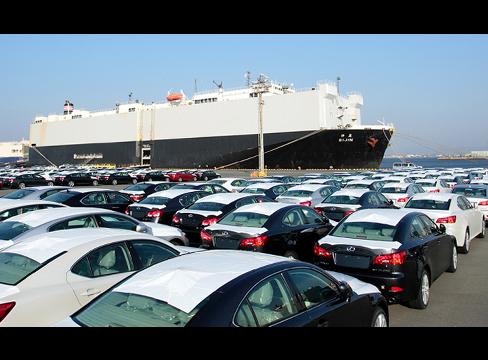
An undated company handout photograph shows Toyota Motor Corp. vehicles bound for export at the company’s Tahara plant in Tahara, Aichi Prefecture, central Japan, released to the media on Oct. 28, 2008. Source: Toyota Motor Corp. via Bloomberg News
Nov. 17 (Bloomberg) — Japan’s economy, the world’s second largest, entered its first recession since 2001 last quarter and the government and economists say conditions may get even worse.
Gross domestic product shrank an annualized 0.4 percent in the three months ended Sept. 30, the Cabinet Office said today in Tokyo. Economists predicted the economy would grow 0.1 percent after contracting a revised 3.7 percent in the previous period.
The slowdown may deepen as the global financial crisis hurts exports, prompting companies from Toyota Motor Corp. to Canon Inc. to slash profit forecasts and cut investments. Japan has the lowest interest rates among the 20 biggest economies and public debt that exceeds 180 percent of GDP, limiting the government’s ability to stimulate growth.
“It’s only going to get worse,” said Masamichi Adachi, senior economist at JPMorgan Chase & Co. in Tokyo. “Japan may be entering its deepest recession in a decade as the global financial crisis cools demand overseas.”
The Nikkei 225 Stock Average closed 0.7 percent higher, reversing declines of as much as 2.9 percent, as investors bought shares of drug and utilities companies, which are less vulnerable to a slowdown. The gauge has lost 43 percent this year. The yield on Japan’s 10-year bond fell two basis points to 1.48 percent.
The yen fell to 97.21 per dollar as of 4:16 p.m. in Tokyo from 96.09 before the report as a stock-market rally across Asia prompted investors to fund purchases of higher-yielding overseas assets in the Japanese currency. The yen has gained 9.2 percent since the end of September, compounding exporters’ woes.
Europe, U.S.
The economy last contracted over two consecutive quarters — the technical definition of a recession — in 2001. Germany also fell into a recession last quarter, as did the entire euro zone, reports showed last week, and the U.S. is probably in one also.
“There is more bad news to come in the next few quarters as the global downturn hits hard,” said Julian Jessop, chief international economist at Capital Economics Ltd. in London.
Leaders from the Group of 20 nations this weekend agreed to take a “broader policy response” by using interest-rate cuts and fiscal stimulus to shore up the weakening global economy. The Bank of Japan has little scope to contribute further after lowering the benchmark rate to 0.3 percent last month, and a 5 trillion yen ($52 billion) stimulus plan announced by Prime Minister Taro Aso last month risks worsening the public debt.
Economic and Fiscal Policy Minister Kaoru Yosano confirmed that the economy had entered a recession that may deepen.
“Given that the global economy is decelerating, Japan’s downturn will continue,” Yosano said. He said there’s a risk that that the slump will become “more severe” because the global financial crisis is spreading to emerging economies.
Businesses Cut Back
Growth in China, which became Japan’s biggest customer in July, slowed to 9 percent last quarter, the weakest since 2003.
Quarter-on-quarter, Japan’s economy shrank 0.1 percent, today’s report showed. Capital spending fell 1.7 percent from the previous three months, compared with economists’ expectations of a 2 percent drop.
Toyota, which makes more than three-quarters of its sales abroad, forecast profit will fall this fiscal year by almost 70 percent. The carmaker will fire 3,000 workers by March, and the Nikkei newspaper reported this month that it will delay adding capacity at a domestic plant that makes Lexus sedans.
Canon, the world’s largest camera maker, last month forecast profit growth would fall for the first time in nine years and said it will cut capital spending 4.7 percent in 2008 to 410 billion yen.
“The economy is still so sensitive to the global business cycle,” said Hiromichi Shirakawa, chief Japan economist at Credit Suisse Group AG in Tokyo. “A long as the global economy keeps sinking, Japan will probably experience a deep recession.”
Exports Weaken
Net exports subtracted 0.2 percentage point from growth after imports outweighed an increase in shipments abroad. Exports rose 0.7 percent, less than the 1.2 percent expected. Imports climbed 1.9 percent as oil surged to a record in the quarter. Economists predicted a 1.5 percent gain.
Still, Japan will probably suffer less than its biggest counterparts after companies shed debt and streamlined labor forces following the bursting of the property and asset bubble in the early 1990s. Asia’s biggest economy will shrink 0.1 percent next year, according to the Organization for Economic Cooperation and Development, less than the 0.9 percent and 0.5 percent contractions in the U.S. and Europe.
Consumers are getting some relief as inflation abates and the government prepares to provide households with at least 12,000 yen ($125) each as part of the stimulus plan. Consumer spending increased 0.3 percent last quarter, more than the 0.1 percent economists expected, today’s report showed.
Not a Good Sign
“It’s difficult to take it as a good sign because the figure was boosted by seasonal factors such as the hot summer and the Olympics,” said Junko Nishioka, an economist at RBS Securities Japan Ltd. in Tokyo. “Consumption will probably turn negative in the fourth quarter” and the economy won’t recover until 2010, she said.
The ratio of jobs to applicants has fallen for eight months and the deteriorating profit outlook for companies is also putting pressure on wages. Winter bonuses, which typically account for about 10 percent of a fulltime worker’s annual pay, will fall 2.9 percent this year, the Nikkei reported last week.
To contact the reporter on this story: Jason Clenfield in Tokyo at [email protected]
Last Updated: November 17, 2008 02:18 EST
By Jason Clenfield
Source: Bloomberg